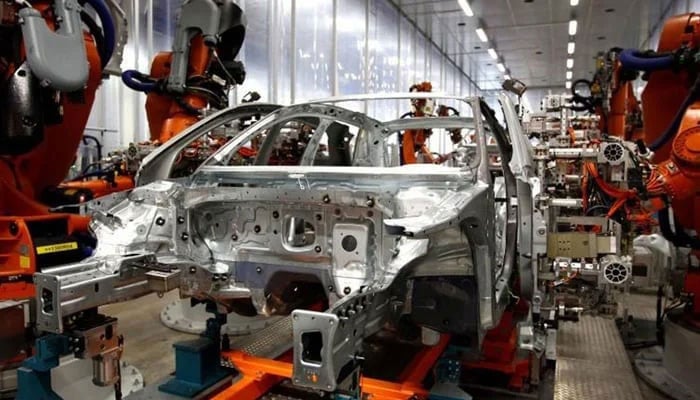Manufacturing slows as LSM falters for third year
EV sector gained traction, with 13 new manufacturers licensed and production reaching 32,923 units
ISLAMABAD: Pakistan’s manufacturing sector growth sharply slowed to 1.3 per cent in FY2025, down from 3.0 per cent last year, as persistent structural bottlenecks and soaring input costs dragged down industrial output. The Large-Scale Manufacturing (LSM) sector contracted by 1.5 per cent, marking its third consecutive year of negative growth despite monetary and fiscal relief.
The manufacturing and mining sectors remain critical to Pakistan’s industrial base, together contributing 13.2pc to the country’s gross domestic product. Within manufacturing, large-scale manufacturing plays a dominant role, accounting for 67.5pc of the sector and 8pc of GDP. It is followed by small-scale manufacturing and slaughtering,which contribute 2.4pc and 1.4pc to GDP, respectively.
While having over two-third share in manufacturing, the slowdown in LSM, offset solid gains in small-scale manufacturing (up 8.8pc) and slaughtering (up 6.3pc). Meanwhile, mining and quarrying shrank 3.4pc, a slight improvement from last year’s 4.0pc dip, yet still highlighting sectoral vulnerabilities.
The July-March period saw LSM contract 1.47pc, with high costs and tax burdens dampening output despite an 850 bps cut in interest rates and power tariff relief. Nearly half of the LSM index (48.8pc) recorded growth, led by textiles, autos, apparel, tobacco, and transport equipment, but heavy losses in food, chemicals, steel, and electricals pulled the index negative.
Auto production surged 40pc, reversing last year’s collapse, thanks to macroeconomic stability and the launch of 31 new models, including EVs. Apparel grew 7.6pc amid rising global demand and shifting export orders from Bangladesh. However, sugar, woolen, and jute products faced steep declines, driven by crop challenges, policy uncertainty, and inefficiencies.
The EV sector gained traction, with 13 new manufacturers licensed and production reaching 32,923 units. Chinese EV giant BYD plans a plant in Karachi by 2026. Meanwhile, chemical and construction-linked industries remained under strain, with falling fertilizer output, weak cement demand, and declining transformer and battery production.
-
 Hailey Bieber's Subtle Gesture For Eric Dane’s Family Revealed
Hailey Bieber's Subtle Gesture For Eric Dane’s Family Revealed -
 Moment Prince William 'broke Down' And 'apologised' To Kate Middleton
Moment Prince William 'broke Down' And 'apologised' To Kate Middleton -
 Paul Mescal And Gracie Abrams Stun Fans, Making Their Romance Public At 2026 BAFTA
Paul Mescal And Gracie Abrams Stun Fans, Making Their Romance Public At 2026 BAFTA -
 EU Rejects Any Rise In US Tariffs After Court Ruling, Says ‘a Deal Is A Deal’
EU Rejects Any Rise In US Tariffs After Court Ruling, Says ‘a Deal Is A Deal’ -
 King Charles Congratulates Team GB Over Winter Olympics Success
King Charles Congratulates Team GB Over Winter Olympics Success -
 Meryl Streep Comeback In 'Mamma Mia 3' On The Cards? Studio Head Shares Promising Update
Meryl Streep Comeback In 'Mamma Mia 3' On The Cards? Studio Head Shares Promising Update -
 Woman Allegedly Used ChatGPT To Plan Murders Of Two Men, Police Say
Woman Allegedly Used ChatGPT To Plan Murders Of Two Men, Police Say -
 UK Seeks ‘best Possible Deal’ With US As Tariff Threat Looms
UK Seeks ‘best Possible Deal’ With US As Tariff Threat Looms -
 Andrew Arrest Fallout: Princess Beatrice, Eugenie Face Demands Over Dropping Royal Titles
Andrew Arrest Fallout: Princess Beatrice, Eugenie Face Demands Over Dropping Royal Titles -
 Rebecca Gayheart Breaks Silence After Eric Dane's Death
Rebecca Gayheart Breaks Silence After Eric Dane's Death -
 Kate Middleton 2026 BAFTA Dress Honours Queen Elizabeth Priceless Diamonds
Kate Middleton 2026 BAFTA Dress Honours Queen Elizabeth Priceless Diamonds -
 Sterling K. Brown's Wife Ryan Michelle Bathe Reveals Initial Hesitation Before Taking On New Role
Sterling K. Brown's Wife Ryan Michelle Bathe Reveals Initial Hesitation Before Taking On New Role -
 BAFTA Film Awards Winners: Complete List Of Winners
BAFTA Film Awards Winners: Complete List Of Winners -
 Millie Bobby Brown On Her Desire To Have A Big Brood With Husband Jake Bongiovi
Millie Bobby Brown On Her Desire To Have A Big Brood With Husband Jake Bongiovi -
 Backstreet Boys Admit Aging Changed Everything Before Shows
Backstreet Boys Admit Aging Changed Everything Before Shows -
 Biographer Exposes Aftermath Of Meghan Markle’s Emotional Breakdown
Biographer Exposes Aftermath Of Meghan Markle’s Emotional Breakdown




